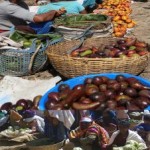MTID Project Note, by Gashaw Tadesse Abate, Kaleb Bayeh, Alan de Brauw, and Kalle Hirvonen. Abstract: This pilot experiment aims to address the knowledge gaps on the nutrition and health benefits of fruits and vegetables to help find ways to increase both consumption frequency and amounts at the house-hold level. While there are already commendable >> Read more Source: Ethiopia Strategy Support Program
Can governments promote homestead gardening at scale? The case of Ethiopia
According to a new IFPRI blog post, eating fruits and vegetables can help ensure adequate nutrition and reduce the risk of heart disease, cancer, and obesity. Yet most people in lower income countries do not get the recommended daily servings of those foods, largely because they cannot afford them. One recent study of produce prices >> Read more Source: Ethiopia Strategy Support Program
High pesticide use poses risks for health, environment: evidence from East and Southern Africa
Africa south of the Sahara is urbanizing rapidly and its real GDP is growing robustly, trends that affect all levels of the food system. Overall demand for food in East and Southern Africa (ESA) is likely to increase by a factor of 3.3 to 9 times in the next 30 years, depending on economic conditions, […] Source: IFPRI Ghana
Affordability of fruits and vegetables in Ethiopia
ESSP Research Note 70, by Kalle Hirvonen, Abdulazize Wolle, and Bart Minten. Abstract: As in many other low-income countries, fruit and vegetable (FV) consumption is very low in Ethiopia. Consequently, micronutrient deficiencies, such as for Vitamin A, are widespread, and more than half of young Ethiopian children suffer from anemia. Efforts to increase FV consumption >> Read more Source: Ethiopia Strategy Support Program


